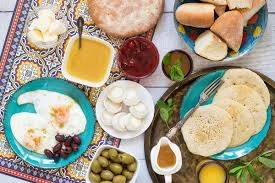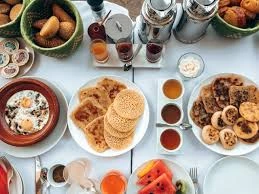How to Make a Traditional Moroccan Breakfast at Home
A Moroccan breakfast is more than just a meal; it’s an experience. Imagine the rich aromas of freshly baked bread, the sweetness of homemade jams, and the refreshing zing of mint tea. It’s a tradition passed down through generations, a ritual that brings together family and friends to start the day in the most flavorful way possible.
When you think of a Moroccan breakfast, what comes to mind? The crusty, golden bread known as Khobz? The savory olives and the rich, nutty spread of Amlou? Or maybe it’s the calming ritual of brewing and sipping mint tea, slowly savoring each sip as the morning light begins to fill the room. You can bring all of this into your own home, even if you’ve never stepped foot in Morocco. Let’s walk through how to make a traditional Moroccan breakfast at home, step by step.
Table of Contents
Table of Contents
What Makes a Traditional Moroccan Breakfast Special?


The Moroccan breakfast is characterized by its simplicity, freshness, and variety. Each element of the meal plays a role in creating a balanced, flavorful start to your day. But beyond the ingredients, a Moroccan breakfast is a reflection of the culture itself—warm, welcoming, and full of tradition.
In Morocco, breakfast is often a communal affair. It’s not just about nourishing your body; it’s about sharing with others. The meal typically includes a combination of bread, olives, cheese, and spreads, along with tea and fresh fruits. This combination creates a rich, balanced experience that will set you up for the day.
Essential Ingredients for a Moroccan Breakfast
To make a traditional Moroccan breakfast, you need to gather a few key ingredients. These staples form the foundation of the meal and will give you that authentic taste of Morocco.
1. Khobz (Moroccan Bread)
Bread is the centerpiece of any Moroccan breakfast. Khobz is a round, crusty bread that’s perfect for dipping in olive oil or smearing with spreads like Amlou. You’ll find Khobz served at almost every Moroccan meal, and it’s typically baked fresh each morning.
2. Olives and Olive Oil
Olives are a staple of Moroccan cuisine, and they make an essential part of the breakfast spread. You can serve them whole, marinated in herbs and spices, or alongside a dish of olive oil for dipping.
3. Amlou (Almond Spread)
Amlou is a traditional Moroccan spread made from roasted almonds, argan oil, and honey. It’s rich, slightly sweet, and has a smooth texture that pairs perfectly with Khobz.
4. Mint Tea
No Moroccan breakfast is complete without mint tea. Known as Atay in Morocco, it’s often served in small, ornate glasses, and drinking it is more of a ritual than just a way to hydrate. The fresh mint leaves combined with green tea and sugar create a refreshing, aromatic drink that complements the meal.
5. Fresh Fruits
Many Moroccan breakfasts include fresh, seasonal fruits. Fruits like oranges, figs, and pomegranates are common, adding a sweet and refreshing contrast to the savory bread and olives.
How to Make Khobz (Moroccan Bread) at Home
Making Khobz at home is simpler than it seems, and the aroma of freshly baked bread will make the effort well worth it. This traditional Moroccan bread has a crispy crust and a soft, chewy interior—perfect for scooping up spreads or dipping in olive oil.
Steps for Making Khobz:
- Prepare the Dough: Combine 3 cups of all-purpose flour, 1 teaspoon of salt, 1 tablespoon of sugar, and 1 tablespoon of active dry yeast. Add 1 cup of warm water and mix until a dough forms. Knead the dough for about 10 minutes, until it’s smooth and elastic.
- Let the Dough Rise: Cover the dough with a damp towel and let it rise for about 1 hour, or until it doubles in size.
- Shape the Dough: Punch down the dough and shape it into a round loaf. You can make it slightly flattened or leave it thicker, depending on your preference.
- Bake the Khobz: Preheat your oven to 375°F (190°C). Place the dough on a baking sheet lined with parchment paper, and bake for about 20-30 minutes until the top is golden brown.
Preparing Amlou: The Sweet Moroccan Spread
Amlou is one of the signature spreads of Moroccan breakfasts. It’s simple yet indulgent, with the rich, earthy flavor of almonds paired with the nutty warmth of argan oil.
Amlou Recipe:
- Roast the Almonds: Start by roasting 1 cup of almonds in a dry skillet over medium heat for about 5 minutes, until they’re golden and fragrant.
- Blend the Almonds: Once the almonds are roasted, let them cool slightly and then blend them in a food processor until they form a paste.
- Add Honey and Argan Oil: Add 2 tablespoons of honey and 3 tablespoons of argan oil to the almond paste. Blend until smooth.
- Adjust the Consistency: If the mixture is too thick, add a bit more oil or honey to reach your desired consistency.
Moroccan Breakfast Side Dishes
A traditional Moroccan breakfast isn’t just about bread and spreads; it’s a whole spread of different flavors and textures. Here are some key side dishes you’ll often find alongside your Khobz and Amlou.
Olives and Olive Oil
Olives are typically served as an appetizer or side dish in Moroccan breakfasts. They are often marinated in a mix of spices like cumin, coriander, and garlic. A bowl of these marinated olives, served alongside a small dish of olive oil for dipping, brings an extra layer of flavor to the meal.
Jben (Moroccan Cheese)
Jben is a soft, fresh white cheese that’s commonly served in Moroccan breakfasts. Its mild flavor makes it a perfect pairing with both sweet and savory items like Khobz and Amlou.
Mint Tea: A Symbol of Hospitality
Mint tea is a staple of Moroccan hospitality. It’s not just a drink; it’s a gesture of welcome and warmth. The combination of green tea, fresh mint leaves, and sugar makes it a refreshing beverage that enhances the meal.
Mint Tea Recipe:
- Brew the Tea: Boil 4 cups of water and add 2 tablespoons of loose green tea. Let it steep for about 5 minutes.
- Add the Mint: Add a large handful of fresh mint leaves to the tea.
- Sweeten: Add sugar to taste. In Morocco, the tea is usually quite sweet, so feel free to adjust the amount of sugar based on your preference.
How to Serve a Traditional Moroccan Breakfast
The way you serve a Moroccan breakfast is just as important as what’s on the table. Moroccan breakfasts are typically served family-style, with everyone sharing from the same platters. This communal approach emphasizes the warmth and hospitality of the meal.
Here’s how to serve your Moroccan breakfast:
- Place the freshly baked Khobz in the center of the table, along with bowls of Amlou, olives, and cheese.
- Pour the mint tea into small glasses and serve it alongside the meal.
- Arrange the fresh fruits on a platter for everyone to enjoy.
Variations of Moroccan Breakfast Based on Region
Just as Morocco’s diverse landscapes influence its food, the traditional breakfast varies from region to region.
- Northern Morocco: The northern regions, with their Mediterranean influence, often include olives, seafood, and fresh vegetables in their breakfast spreads.
- Southern Morocco: In the southern regions, you’re likely to find richer flavors, including spreads made from argan oil, a local specialty.
Moroccan Breakfast for Vegetarians or Vegans
If you’re following a vegetarian or vegan diet, making a Moroccan breakfast at home is still very much possible. Many traditional dishes are naturally vegetarian or can be easily adapted.
- Amlou: Simply use a vegan-friendly alternative to honey, like maple syrup or agave.
- Khobz: The bread is typically made without animal products, so it’s a great option for vegans.
- Olives and Olive Oil: These are naturally vegan, so you don’t need to make any changes.
FAQ: Moroccan Breakfast FAQs
Q1: What is the most important part of a Moroccan breakfast?
- A: The most important part is typically Khobz, the round bread, which serves as the base for the meal.
Q2: Can I make Moroccan breakfast bread in advance?
- A: Yes, you can make the bread the day before and store it in an airtight container.
Q3: What is a typical Moroccan breakfast drink?
- A: Mint tea is the drink of choice for breakfast in Morocco, known for its refreshing and soothing qualities.
Q4: Are Moroccan breakfasts healthy?
- A: Yes, Moroccan breakfasts typically include fresh fruits, healthy fats from olives and oils, and whole grains from the bread.
Conclusion: Bringing a Taste of Morocco to Your Home
Now that you know how to make a traditional Moroccan breakfast at home, it’s time to get cooking. This meal is more than just food; it’s a way to connect with Moroccan culture and traditions. From the crusty Khobz to the sweet Amlou and refreshing mint tea, every element of the meal offers a taste of Morocco that will brighten your mornings. So gather your ingredients, invite your loved ones to the table, and enjoy the flavors of Morocco right in your own kitchen.
Ready to try making your own Moroccan breakfast? Let us know how it turned out in the comments below!
Reviews
There are no reviews yet. Be the first one to write one.

